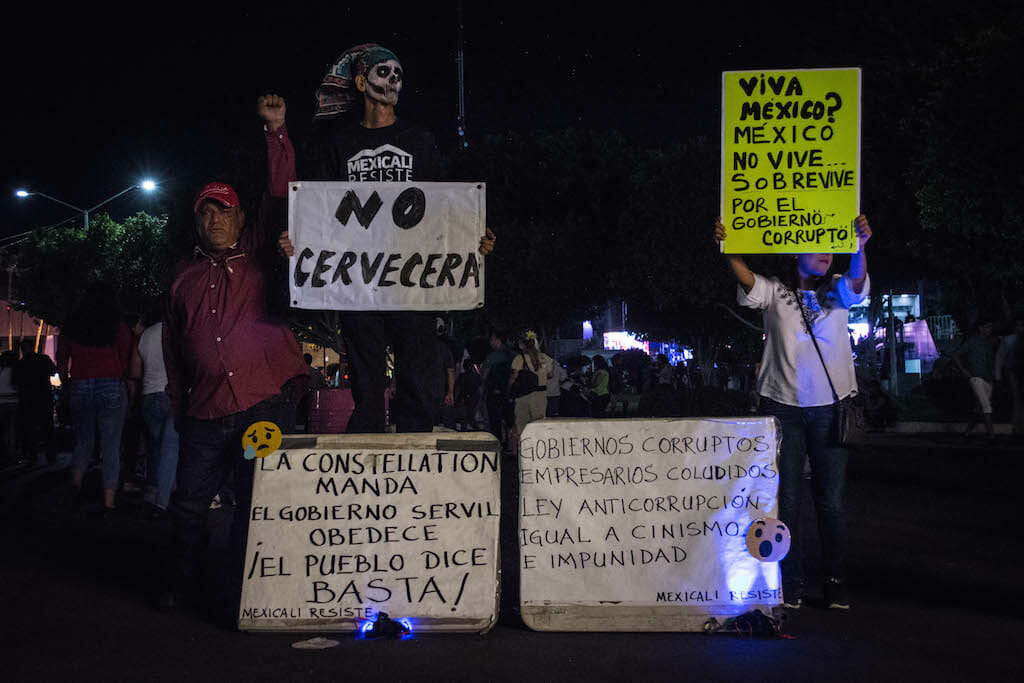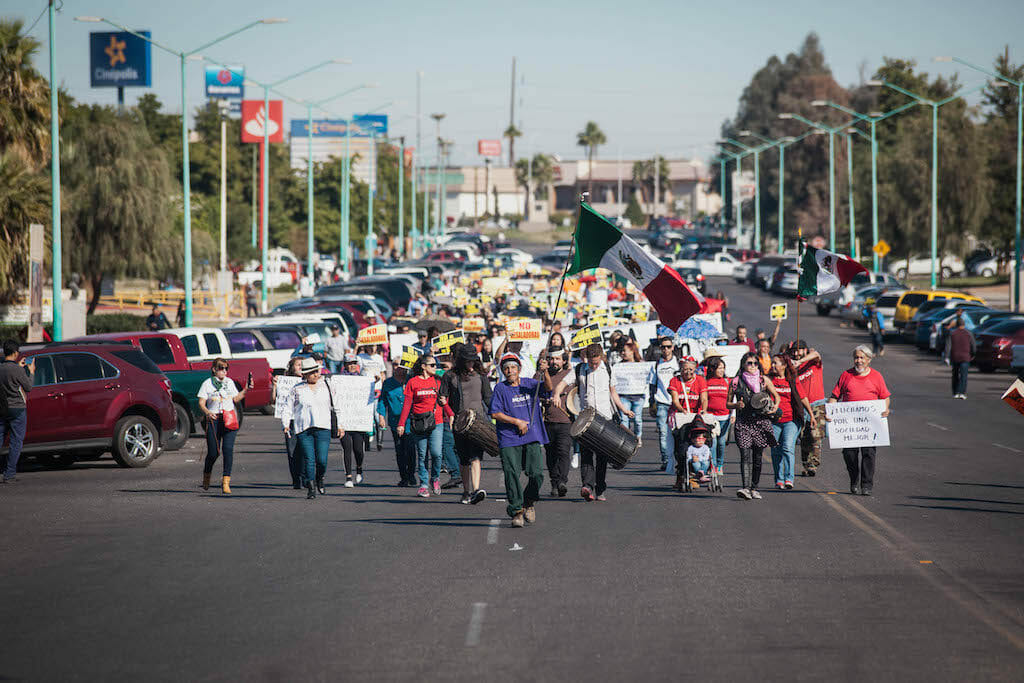Mexicali’s ‘Water Defenders’ Take the Fight to Big Alcohol
A Mexican "water is life" movement is growing as activists take on Constellation Brands, a U.S.-based multinational corporation. Día de la Independencia protest. (Courtesy of Mexicali Resiste)
Día de la Independencia protest. (Courtesy of Mexicali Resiste)
In January 2017, the Mexican government implemented a 20 percent hike in gasoline prices, setting the stage for a nationwide rebellion and a people’s mobilization against the tightening screws of neoliberalism. To a population already struggling with poverty and low wages, this blatant exercise of power and greed was a wake-up call heard across Mexico.
Today, the struggle continues, but in the desert border city of Mexicali it has expanded to the protection of water, as the people face off with a United States-based multinational corporation known as Constellation Brands. In a familiar scenario in which capitalism seeks to privatize the commons, and through secret backroom deals with corrupt politicians, Constellation Brands wants access to Mexicali’s precious water to produce alcohol for exclusive export to the U.S.
At a time of increased precariousness around anthropogenic climate disruption, we are witnessing the front-line battles where dwindling natural resources are being contested, where capitalism’s insatiable appetite for profits is like a drunk frantically wringing a damp cloth for a few more drops of alcohol, and where people are fighting back and organizing against a soulless and rapacious economic system.
It is no accident that we are hearing similar slogans in Mexicali that we heard at Standing Rock, where Native American communities faced off with Wall Street oil predators, and reminded us that water is life.
The people of Mexicali Resiste have been organizing now for over a year, and the battle to defend their water is escalating. There are now calls for an organized boycott of Constellation Brands.
At the beginning
Mexicali, the capital of Baja California, is a quintessential NAFTA city, with a long history of capitalist interest in its workforce and natural resources. On Jan. 4, 2017, this modern rebellion manifested itself when people blocked the Pemex distribution plant at La Rosita, leaving gas stations closed and the city paralyzed.
At the same time as the federal hike in gasoline prices, the state imposed a transportation and environmental tax on license plate renewals. This combination of being hit with both a federal and state tax increase was too much for people to bear, sparking a blockade of a tax collection center at city hall that escalated into an organized march on Jan. 12, 2017, of nearly 12,000 people in the civic center of Mexicali, where Baja California’s federal, state and municipal offices are concentrated.
The sight of the angry crowd in the largest protest to that date scared the shit out of several Congress members, so much so that they began to flee the civic center. Blockades of both City Hall and Congress followed, giving birth to camps not too dissimilar from Occupy Wall Street.
Later that week, on Jan. 15, as a part of the national resistance against the gas hike, another march took place and became the largest protest in Mexicali history, with upward of 75,000 people attending. The sheer number of people who took part reinforced the idea of a total government blockade, as five more camps were setup.
As federal, state and local police were sent in to clear the civil disobedience groups, organizers dug in for the long haul. Over the next year, the struggle would continue with many different groups being spawned from the initial rebellion.
Groups such as Mexicali Consciente, Baja California Resiste, Conciencia Civil Cachanilla and Tecate en Pie de Lucha were formed in Baja California, and all are a part of a growing people’s movement, despite different ideological and methodological organizing models.
As the camps remained intact, organizers created multiple working groups, or committees, for various tasks, including research and communications, with weekly assemblies open to the public. This allowed the movement to serve as a vigilant watchdog against the government. And it was this vigilance that led to their most important discovery—namely, that the city government cut a secret water supply deal with the multinational corporation, Constellation Brands.
Mexicali Resiste—Locally Made. Constellation Brands—Made in the USA.
Out of this initial rebellion, a people’s resistance movement calling itself Mexicali Resiste was born. Predominantly known for its incessant opposition to the establishment of the Constellation Brands brewery in Mexicali, an effort that has warranted them the title of “water defenders,” Mexicali Resiste has been closely monitoring the government for fraud and corruption.
Constellation Brands is a U.S.-based corporation and NAFTA beneficiary headquartered in New York that produces and markets alcohol (beer, wine and spirits), distributing brands such as Corona Extra, Corona Light, Modelo Especial, Negra Modelo, Pacifico, Victoria and Ballast Point. In collusion with Francisco “Kiko” Vega de Lamadrid, the governor of the state of Baja California, they negotiated a backroom deal giving them access to Mexicali’s water supply in the heart of the farmlands just south of the U.S. border.
Needless to say, granting a foreign corporation guaranteed access to public water in a secret, unreleased agreement fueled the movement and its 24/7 civic center occupation in front of Congress. Concerns over the legitimacy and transparency of the deal were ignored, as were requests for public records and copies of the contracts.
This theft of public water for private profit would later result in multiple physical blockades of the brewery construction site, reinforcing the people’s commitment to preserving Mexicali’s water through nonviolent, direct action.
Corporate and Ruling-Class Collusion First—Repression Second
It is estimated that Constellation Brands would use 20 million cubic meters of water per year throughout its 50-year contract. That’s 38,000 liters per minute, 634 liters per second, or 140 gallons per second.
As in California, the people of Baja California are concerned about drought and the ecological impacts such water consumption would have in the desert region, as Colorado River expert Alfonso Cortés methodically explains in his writings. The movement has attracted the attention of farmers, hydrologists, geologists and oceanographers, all being asked to contribute relevant research to the fight.
How is it possible such a secret deal could be struck in the first place? A recently enacted law known as the Public and Private Associations law, or PPP (in English, Public-Private Partnership), basically allows the state to make business deals with the private sector with very few regulations.
Due to increasing public pressure, however, Gov. “Kiko” on Jan. 17, 2017, repealed the tax on license plates, and apparently, a vague “water law” that would have increased the price of city water use, essentially a tax on the population.
As the pressure and vigilance of the movement continued, several tactics were used to break the blockades of government offices and remove the camps. In one case, on Jan. 28, 2017, shortly after a provocation by the governor and his security team, who showed up unannounced to break the blockades, enraged members of the camps chased the governor and his security team into their cars. His response was to order undercover police into the camps in the wee hours of the morning to break them up.
Watch video of people surrounding Gov. “Kiko” Vega:
Watch video of the 3 a.m. police raid:
Congress Watchdogs and State Repression
Under the increasing public scrutiny of the government’s actions, sessions of the Congress were often held in the middle of the night (in one case at 2 a.m.), with limited or no access for citizens. Public access to sessions of Congress is protected by law, but in the case of Baja California, it was illegally blocked.
One of the most outrageous measures the Mexicali City Council tried to pass was a motion to forgive at least 132 million pesos (approximately $7.1 million) in property taxes owed by large corporations, almost twice the amount of the municipal government’s public investment budget. Attempts to pass this kind of legislation behind the backs of the people prompted organizers at the camps to call on the general public to mobilize.
Watch video of the city attempts to wipe away corporate debt:
Two school buses full of police, canine and intelligence units arrested 14 people inside city hall. There was a high level of concern for their safety as several movement members were nowhere to be found, particularly in a country where forced disappearances are often utilized as a method of control against civil resistance.
As those arrested were transferred to several different jails, some managed to transmit messages live on social media from inside the police vans, alerting comrades to their whereabouts and mobilizing them to aid in their release.
Social media documentation had such a negative impact on the government’s image that it initiated further intimidation tactics. In one such case, movement member Tania Gallaga’s house was attacked with a Molotov cocktail after she had confronted a female police officer on Black Monday.
On July 4, 2017, Mexicali Resiste communication and media offices were broken into. Several hard drives were stolen and paper files containing months of documentation and research disappeared. Later, the pressure and antagonism grew to such levels that Congress erected a see-through barrier wall to keep an angered and awakened public at bay, but public ridicule in the media forced them to remove the barriers—such a visible symbol of tyranny.
To the Blockades
Blockades have been an integral tactic of the movement in Mexicali. When Constellation Brands’ machinery was spotted being transported into the city, blockades were set up at the brewery’s construction site. Movement organizers visited the site unannounced, revealing the grim conditions facing workers from southern Mexico, who had to pay for their own transportation to get to the border city and sleep on the floors of the construction site.
Just like the oil companies at Standing Rock, Constellation Brands justifies its presence in the region under the worn-out trope of providing jobs to workers, while simultaneously neglecting legal employment regulations by paying workers under the table, or hiring nonuniformed security forces wearing ski masks and bandanas.
Not surprisingly, rumors began to spread on state-friendly media claiming that the contract allowing the deal was public and legitimate. Everything is OK, now just go back to sleep. To this day, no one has seen the paperwork.
As huge water-tank containers were being brought in from Ensenada on flatbed trucks, organizers mobilized to block their entry onto the brewery premises. Seeing the determination and bravery of those on the blockade, the hired truck drivers left their cargo out on the road for weeks, until police and their threat of violence paved the way for the delivery.
Watch video of the huge water tanks, and the words of Don Raymundo (Indio Zapoteco):
Watch video of action to stop the transport of the water tanks:
Watch video of the confrontation with police during the last blockade:
As anthropogenic climate disruption is being exacerbated by a capitalism run amok, we must unite across borders and support movements fighting against the destruction of the biosphere, against resource exploitation, and for dignity.
Boycott Constellation Brands
In Mexicali, we defend our water. Boycott Constellation Brands for taking away this resource. This is our mission statement:
To the community and the immigrants of the United States and to the different nations around the world:
The city of Mexicali, Baja California, Mexico, needs your help. Constellation Brands Brewing Company insists on depriving us of our own water in order to export it to the United States as beer. Because of this, we are asking you to help us boycott Constellation Brands in defense of our water, and we ask you not to consume any Constellation Brands product. This company is also owner of Grupo Modelo in the United States. If money is what drives the economic interests of this corrupt company, we must strike where it hurts the most: economically.
We’re asking you to help us boycott Constellation Brands because we are tired of being the petty-cash country of the United States, economic superpower to which the Mexican government has given mining, oil, beaches, land, and, finally, our water.
But because water is a nonrenewable and vital natural resource for all life on this planet. To fight for it is also a fight for sovereignty and national security, as well as a struggle for the defense of our territory. This foreign company has arrived only to find anything of value in Mexico and take it as money to its banks and money safes.
We’re asking you to help us boycott Constellation Brands because this brewing company has come to Baja California to dry us out, just as it did to the municipality of Nava, Coahuila, Mexico.
We’re asking you to help us boycott Constellation Brands because they come to Mexico to pay almost no taxes, to buy land at ridiculous prices, and to displace the Mexicali Valley farmers with threats and violence.
We’re asking you to help us boycott Constellation Brands because they come to pay low wages and take our water without any regards, and then want to pay for it as if they were a regular client due to a decree by Gob. Francisco “Kiko” Vega de Lamadrid, benefiting the U.S. company with the lowest water rate available.
We’re asking you to help us boycott Constellation Brands because of the repeated massive security deployments of every police force of the state to protect a beer company. And we remind you that these are police forces who are paid for with tax money from every Baja California citizen, thus placing the economic interests of the United States before Mexican citizens’ right to public safety.
We’re asking you to help us boycott Constellation Brands because the construction companies that are doing this job belong to politicians like Victor Hermosillo Celada and state-related companies that have benefited from illegal tax exemptions, like Grupo Cadena, supporting themselves on their political influence with the Baja California government for many years.
We’re asking you to help us boycott Constellation Brands because this is a monument to corruption around the world and to the unlawful influence of U.S. economic interests and the Mexican political and economic elite.
We’re asking you to help us boycott Constellation Brands because the corrupt company by the name of Constellation Brands is taking away our water and is spilling our blood: blood of us Mexicans who put our bodies before the local and state police of Baja California, both of them bought by foreign money.
We’re asking you to help us boycott Constellation Brands because the Latino community in the United States and abroad is being sold a marketed image of Mexican pride when the purchase of these Grupo Modelo/Constellation Brands products in the United States are indeed hurting their Mexican brothers and sisters, their families.
This is how we ask for your help to share and spread this information to all the corners of the United States and the world.
Stop dispossession, abuse, corruption, and the impunity of corrupt industries and politicians.
Not a single isolated struggle anymore.
Wholeheartedly,
Grupo-Colectivo Mexicali Resiste
Water is life, and capitalism is death.
For more information, visit the Mexicali Resiste website, Facebook page, or contact Mexicali Resiste organizers at [email protected].

Chris Burnett hosts the weekly radio show “Indymedia On Air” on KPFK 90.7 FM Los Angeles, based on the global Indymedia network, and has been a longtime organizer in anti-authoritarian movements. You can email him at [email protected].
Marco Vera is the founder and director of Mexicali Rose Media/Arts Center, a grass-roots communitarian organization dedicated to providing free access to artistic media for the community youth of Mexicali, Baja California.
Your support matters…Independent journalism is under threat and overshadowed by heavily funded mainstream media.
You can help level the playing field. Become a member.
Your tax-deductible contribution keeps us digging beneath the headlines to give you thought-provoking, investigative reporting and analysis that unearths what's really happening- without compromise.
Give today to support our courageous, independent journalists.






You need to be a supporter to comment.
There are currently no responses to this article.
Be the first to respond.